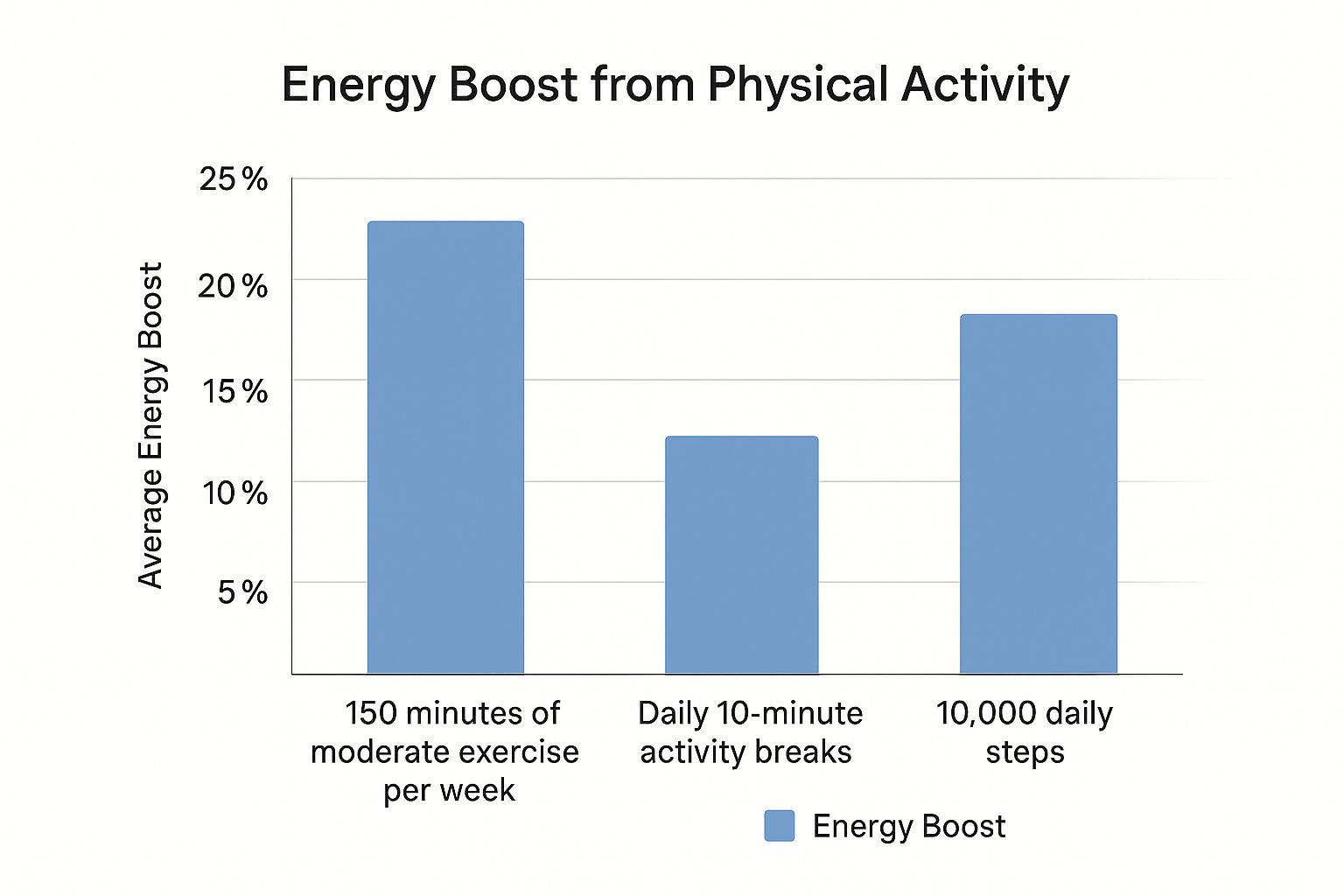The best natural ways to increase energy aren't quick fixes. They require you to master your sleep, dial in your nutrition, move your body regularly, and get a handle on stress. Follow these actionable steps to build the foundations of real, sustainable vitality that goes far beyond the temporary jolt of coffee or a sugary snack.
Why You Feel Drained and How to Recharge Naturally

Feeling constantly wiped out is a direct signal from your body that its energy production line is under strain. Think of your body as a high-performance engine. To run at its best, it demands premium fuel, consistent maintenance, and proper time to cool down. When any of those are missing, performance plummets.
That drained sensation often traces back to your cells' tiny powerhouses: mitochondria. Their job is to convert food and air into cellular fuel. When they’re working efficiently, you feel alive and sharp. Modern habits like poor diet, lack of sleep, and chronic stress act like dirty fuel, clogging the engine and slowing the whole system down. That's when fatigue takes hold, making it a struggle to focus or feel motivated.
Pinpoint the Root Causes of Your Fatigue
To effectively implement natural ways to increase energy, you first have to pinpoint what’s draining your tank. The main culprits—poor sleep, a diet heavy in processed foods, and non-stop stress—are usually tangled together, directly hammering your cellular powerhouses.
Your daily energy level isn't random; it's a direct reflection of your lifestyle choices. Build lasting vitality not with a quick fix, but by creating a strong foundation of healthy habits that support your body’s natural energy production cycle.
These negative inputs force your body to work overtime for less reward, which is why you can feel exhausted even after a full night’s sleep. For a closer look at this, explore these effective natural remedies for fatigue to give your energy levels a real boost.
Your Action Plan for Lasting Vitality
The solution isn’t one magic pill but a holistic approach. To build genuine, long-lasting energy, follow this framework built on four key pillars that work together to refuel your body and mind:
- Master Your Sleep: Make quality sleep your non-negotiable reset. It’s when cellular repair happens and your brain clears out clutter. Without it, every other effort is undermined.
- Fuel Your Body: Choose foods that provide the raw materials for steady energy production, not a sharp spike followed by a crash.
- Create Energy with Movement: Use physical activity as a powerful energy generator. It builds more mitochondria, turning your body into a more efficient energy-making machine.
- Manage Stress Leaks: View chronic stress as a hole in your fuel tank. Learn to plug that leak to keep your energy levels topped up.
By focusing on these areas, you can stop just coping with fatigue and start building a real foundation for vibrant, long-term energy. This approach gives you the tools to create powerful and lasting change.
Mastering Your Sleep for All-Day Vitality

When it comes to natural ways to boost your energy, mastering sleep is your most powerful tool for repair and recovery. This isn't just about logging more hours. To get lasting vitality, you need deep, restorative sleep that lines up with your body's internal clock, known as the circadian rhythm. Work with this biological timer, not against it, to wake up genuinely refreshed.
Create the Ultimate Sleep Sanctuary
Your bedroom should send one clear message to your brain: it's time to rest. The first step to getting better energy is to reclaim this space as a true sleep sanctuary. The goal is to get rid of any sensory distractions that could disrupt your rest and signal to your nervous system that it's safe to power down.
Here are the non-negotiable actions for the perfect sleep setup:
- Make It Dark: Use blackout curtains and cover or remove any glowing gadgets. Even tiny amounts of light can disrupt melatonin, your sleep hormone.
- Keep It Cool: Set your bedroom temperature between 16-18°C. Your body temperature needs to drop to initiate sleep, and a warm room will leave you tossing and turning.
- Keep It Quiet: Use earplugs, a white noise machine, or a fan to create a consistent, soothing background sound that drowns out any disturbances that could pull you out of deep sleep.
Master Your Light Exposure
Light is the single biggest cue for your circadian rhythm. Getting your light exposure right is a total game-changer for your energy levels.
Get 10-15 minutes of bright, natural sunlight within an hour of waking up. This simple act locks in your internal clock, signals that the day has started, boosts alertness, and sets you up for a better night's sleep later.
Conversely, as evening approaches, you must cut down on bright, artificial light, especially the blue light from screens.
An hour or two before bed, start dimming the lights. Put down your phone, switch off the tablet, and turn off the TV. This ‘power-down’ period signals to your brain to start producing melatonin, preparing your body for restorative rest.
Implement a Power-Down Routine
You can't go from one hundred miles an hour to zero the second your head hits the pillow. A consistent pre-sleep routine is the bridge you need to wind down. The key is consistency. Pick a few calming activities and do them every single night in the hour leading up to bedtime.
Try adding these actions to your nightly ritual:
- Stop Eating Early: Finish your last meal at least two to three hours before bed. Digestion is an active process that can interfere with quality sleep.
- Take a Warm Bath or Shower: As your body cools down after a warm bath, it helps induce a sleepy feeling and promote deeper rest.
- Practice Gentle Stretching or Reading: Release muscle tension with light stretching or calm a racing mind by reading a physical book (not on a screen!).
- Avoid Stimulants: Steer clear of caffeine and alcohol in the late afternoon and evening. Both can seriously disrupt the quality and structure of your sleep.
By taking control of your environment, light exposure, and evening habits, you provide the clear signals your body needs for the deep, restorative sleep that builds lasting energy.
Fuelling Your Body For Sustained Energy
Think of your body like a high-performance engine. The food you eat is its fuel, and making smart choices is one of the most powerful natural ways to increase energy. Your goal is not a short-lived sugar rush, but a slow, steady release of energy that lasts all day. This steady supply comes from getting your macronutrients right: complex carbohydrates, lean proteins, and healthy fats burn slowly and consistently, providing energy for hours. Simple sugars and refined foods are like paper on a fire—a brief flare followed by a rapid burnout.
Build Your Plate Around The Big Three
To keep your energy stable, ensure every meal is a balanced combination of the three key macronutrients. Each one plays a unique role in fuelling your body and keeping your blood sugar stable, which is the secret to avoiding energy dips.
Here's your action plan for building a plate that keeps you going:
- Choose Complex Carbohydrates: These are your body’s primary fuel. Eat oats, brown rice, quinoa, and sweet potatoes, which break down slowly for a reliable stream of energy.
- Include Lean Protein: Protein slows carbohydrate absorption, stabilising blood sugar. It's also essential for tissue repair. Good sources include chicken, fish, beans, lentils, and tofu.
- Add Healthy Fats: These are crucial for brain function and help you feel full. Get them from avocados, nuts, seeds, and a drizzle of olive oil.
Combining these three creates a synergy that keeps you full, focused, and energised for far longer than a meal of simple carbs alone.
Hydration: Your Overlooked Energy Source
Feeling sluggish? Before changing your diet, check your water intake. Even mild dehydration—a loss of just 1-2% of your body's water—can impair cognitive function and leave you feeling drained. When you're low on fluids, your blood volume decreases, forcing your heart to work harder to pump oxygen and nutrients, a process that eats into your energy reserves.
The fix is simple: drink water consistently throughout the day, even before you feel thirsty. Aim for around two litres daily, and more if you're active. Thirst is a late signal that dehydration has already begun.
Add Key Micronutrients That Fight Fatigue
Certain vitamins and minerals are game-changers for your body's energy production. A shortfall in these can be the hidden reason for persistent tiredness.
Focus on these two essential energy-related micronutrients:
- Iron: This mineral is vital for creating haemoglobin, which carries oxygen from your lungs to the rest of your body. Low iron means less oxygen delivery, leading directly to fatigue. Find it in red meat, spinach, lentils, and fortified cereals.
- B Vitamins: The B-vitamin family, especially B12, is crucial for converting food into usable energy. A deficiency can disrupt this entire process. These are found in meat, eggs, dairy, and leafy greens.
To optimize cellular energy, explore how certain ancient compounds can support modern needs. Learn more by reading about Shilajit's benefits for boosting energy and wellness naturally, which dives into how traditional remedies fit into today's lifestyle.
Making smart food choices is fundamental. Use the table below as your quick guide to fuelling for the long haul.
Energy-Boosting Foods vs Energy-Draining Foods
| Nutrient Category | Energy-Boosting Examples (Sustained Release) | Energy-Draining Examples (Spike and Crash) |
|---|---|---|
| Carbohydrates | Oats, brown rice, quinoa, whole-wheat bread, sweet potatoes | White bread, sugary cereals, pastries, sweets, fizzy drinks |
| Protein | Chicken breast, fish, eggs, lentils, beans, tofu, Greek yoghurt | Processed meats (sausages, bacon), fried chicken, fatty cuts of red meat |
| Fats | Avocado, nuts, seeds (chia, flax), olive oil, fatty fish (salmon) | Fried foods, margarine, baked goods with trans fats, processed snacks |
| Fruits & Veg | Berries, apples, bananas, leafy greens (spinach), broccoli | Tinned fruit in heavy syrup, fruit juices with added sugar |
By focusing on the "Energy-Boosting" column, you're not just eating—you're strategically fuelling your body for peak performance, day in and day out.

The image above highlights how different lifestyle choices, including physical activity, contribute to your overall energy levels. It's clear that building consistent, moderate habits offers the most significant and sustainable boost to your vitality.
Using Movement to Create More Energy

It sounds like a paradox: when you're wiped out, the last thing you want to do is move. But here’s the secret: spending a little energy is one of the most reliable ways to get more back. Getting active triggers a powerful response in your body. It gets your heart pumping, sending a wave of oxygen-rich blood to your brain and muscles for an immediate lift.
Better yet, regular activity signals your body to become more efficient at creating fuel. Think of the mitochondria in your cells as tiny power plants. If you're sedentary, your body only keeps the bare minimum running. Once you start moving regularly, your body senses the new demand and responds by building more of these powerhouses, increasing your total energy capacity.
Take Action to Create Energy
Movement has the power to break the vicious cycle of fatigue and start a virtuous one of vitality. When you’re tired, you don't move. This makes your body less efficient at producing energy, which makes you feel even more exhausted. Exercise shatters that loop. Every time you move, you trigger a release of feel-good endorphins that boost your mood and set you up for better sleep later—a chain reaction where one good habit fuels the next.
The common myth is that you need energy to exercise. The truth is that you must exercise to create the very energy you're looking for. It builds a more resilient and efficient internal engine.
Prioritize Consistency Over Intensity
You don’t have to run a marathon. For boosting energy, the key is consistency, not intensity. Pushing too hard when you’re already tired can backfire and lead to burnout. The goal is to weave gentle, sustainable movement into your daily life. The NHS suggests aiming for at least 150 minutes of moderate-intensity exercise each week, which can significantly reduce fatigue.
Studies show that people who exercise regularly report up to a 20% increase in energy and a significant drop in daytime slumps. You can discover more insights about these UK-based renewable energy statistics on uSwitch.com. This proves that small, steady efforts add up to big rewards.
Practical Steps to Integrate Movement
Finding ways to move more doesn't require a massive lifestyle change. The trick is to spot opportunities in your existing routine. Start small—so small it feels too easy to skip.
Here are simple actions to get you started:
- Follow the 5-Minute Rule: On days you feel completely drained, commit to just five minutes of movement. Take a brisk walk around the block or do a few gentle stretches. Often, that tiny initial push is all it takes to feel a spark of energy return.
- Embrace "Exercise Snacking": Break your activity into bite-sized chunks instead of one long session. A 10-minute walk after lunch, a few squats while the kettle boils, or taking the stairs instead of the lift—these mini-bursts add up.
- Find an Activity You Enjoy: The best exercise is the one you'll actually do. If you hate the gym, don't force it. Try dancing in the kitchen, gardening, cycling, or joining a local walking group. When movement is fun, you're more likely to stick with it.
By shifting your mindset and seeing movement as a tool for creating energy, you can build positive momentum. Each small step makes the next one easier, gradually building a stronger, more vibrant you.
How to Stop Stress from Draining Your Energy
Chronic stress is a silent energy thief, quietly siphoning your reserves until you’re running on empty. Picture your energy as a smartphone battery. Every stressful event—a deadline, a difficult conversation, or worrying—is like an app running in the background, slowly draining your power.
This happens because your body’s stress response, designed for short-term emergencies, was never meant to be constantly on. When you're perpetually stressed, your system is flooded with hormones like cortisol. This keeps you in a state of high alert, which is incredibly demanding and exhausting. This constant 'on' state disrupts sleep, messes with digestion, and creates brain fog, creating a vicious cycle that drains even more of your precious energy.
Use Simple Techniques to Calm Your Nervous System
The good news is you can actively switch off this stress response. One of the quickest and most effective methods is controlled breathing. By consciously slowing your breath, you send a direct signal to your brain that the danger has passed and it's safe to relax.
Try this simple box breathing exercise right now:
- Breathe In: Slowly inhale through your nose for a count of four.
- Hold: Gently hold your breath for a count of four.
- Breathe Out: Slowly exhale through your mouth for a count of four.
- Hold: Hold your breath again for a final count of four before repeating.
Just a few rounds of this can immediately calm your nervous system and stop a cortisol surge. To go deeper, you can explore other natural ways to reduce cortisol and start reclaiming your energy.
Tap into the Restorative Power of Nature
Another powerful action for managing stress is to get outside. Research shows that even 20 minutes spent in a natural setting, like a local park, can significantly lower stress hormone levels. This doesn't require a major expedition; a short walk during your lunch break is enough to feel the benefits.
Getting outside helps disconnect you from the constant digital noise that feeds stress. The simple act of feeling the sun on your skin or hearing birdsong grounds you in the present moment, offering an instant mental reset.
Plug Energy Leaks by Setting Boundaries
Finally, a major and often overlooked energy drain is a lack of personal boundaries. Constantly saying "yes" when you mean "no" is a guaranteed recipe for burnout. Every commitment requires energy.
Setting healthy boundaries is essential self-preservation. It means recognising your limits and protecting your time and energy. Start small. Identify one area where you feel overextended and practice saying "no" politely but firmly. Plugging this one leak can free up a surprising amount of mental and physical energy.
Your Questions on Natural Energy Answered
Starting a journey to reclaim your energy can bring up many questions. Here are clear, straightforward answers to guide you in making changes that stick. This section tackles the most common queries about boosting energy naturally, from how long it takes to feel a difference to the role of supplements and the best first step when you’re just too tired to begin.
How Long Until I Feel More Energetic After Changing My Habits?
While everyone’s body is different, you can often feel initial improvements in just a few days. Some habits offer quick wins, while others build benefits more gradually. For instance, fixing your sleep hygiene can be a game-changer almost overnight. Getting a consistent 7-9 hours of quality sleep can reduce next-day grogginess and improve mental clarity within a week. The same goes for simple diet tweaks like ditching processed sugars and hydrating properly—this can stabilize your blood sugar and stop afternoon slumps almost immediately.
Think of it this way: better sleep and hydration are like putting fresh batteries in a device—the power boost is instant. Exercise and long-term dietary shifts are more like upgrading the device's internal hardware for better efficiency—the full benefits build over several weeks.
With exercise, you’ll likely feel a post-workout buzz straight away from endorphins. But the deep, lasting increase in energy reserves—from your body building more cellular power stations—typically takes 4 to 6 weeks of consistent effort to lock in. Be patient; small, steady actions create the biggest rewards.
Are There Supplements That Can Naturally Boost My Energy?
Yes, the right supplements can be fantastic allies, but they should always complement a healthy lifestyle, not replace it. The foundations—sleep, nutrition, and stress management—must come first. When considering supplements, focus on ones that support your body's own energy-making processes. Some of the most well-regarded for fatigue include:
- B Vitamins: This family of vitamins, especially B12, is crucial for turning food into cellular energy. A shortfall can lead directly to sluggishness.
- Iron: If you have a diagnosed deficiency, restoring your iron levels is essential. Iron is needed to make haemoglobin, which carries oxygen to your cells. Without enough oxygen, energy production stalls.
- Magnesium: This mineral is involved in hundreds of bodily processes, including energy metabolism. It’s a key player in converting fuel into power.
- Adaptogens: Herbs like Ashwagandha help your body become more resilient to stress. By calming your stress response, they stop cortisol from constantly draining your energy tank.
Always talk to a healthcare professional before starting any new supplement to ensure it’s the right choice for you.
Is Coffee a Good Way to Increase My Energy?
Coffee can provide a real, short-term jolt of energy. The caffeine stimulates your central nervous system, making you feel more alert. A cup or two in the morning can be a helpful ritual. However, coffee doesn't create energy; it borrows it from your future reserves by blocking brain chemicals that signal tiredness. This can lead to a crash later in the day, trapping you in a cycle of needing more coffee just to feel normal.
Furthermore, caffeine late in the day can disrupt your sleep, preventing the restorative rest needed to genuinely recharge. This creates a vicious cycle: you're tired, so you drink coffee, which leads to poor sleep, and you wake up even more exhausted. Use coffee as a strategic tool in the morning, but put your main focus on the natural ways to increase energy that fix the root causes of fatigue.
I Am Too Tired to Exercise. What Is the First Step?
This is the most common hurdle. When you're running on empty, the idea of a "workout" is overwhelming. The key is to reframe the goal and start so small it feels almost ridiculous. Forget the word "workout." Your only mission is to break the cycle of inactivity. The first step is to simply move your body for five minutes. That's it.
This could be:
- A gentle walk to the end of your road and back.
- Stretching to your favourite song in the living room.
- Doing a few slow laps of your garden.
This simple act gets your blood flowing, delivers more oxygen to your brain, and releases a trickle of mood-boosting endorphins. It creates a small spark of energy. Tomorrow, do it again. By proving to yourself that you can take that first tiny step, you build momentum. Soon, the exercise itself will start giving you more energy than it takes, making the next step that much easier.
Ready to support your body’s natural energy production at a cellular level? The foundational habits in this guide are your primary tools, but for an added edge, consider the nutrient-rich support of Oji Shilajit. Our enhanced gummies are formulated with over 85 trace minerals and powerful adaptogens to help you reclaim your focus, manage stress, and build lasting vitality. Discover the difference at https://myoji.co.uk.








